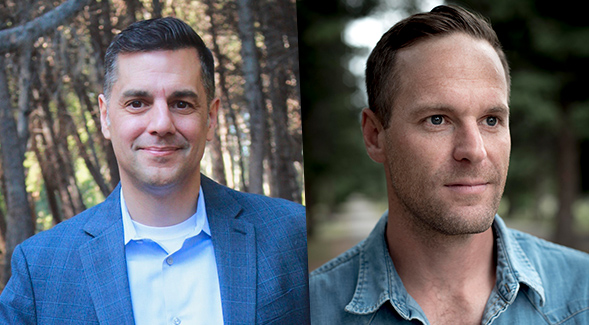Documentary Podcast Walks in Afghanistan Veteran's Boots
An NEH grant supports the project at the Center for War and Society and focuses on members of the Marines Third Squad.

Gregory Daddis, professor of history and director of San Diego State University's Center for War and Society, and journalist and former combat engineer Elliott Woods received a National Endowment for the Humanities (NEH) Chairman's Grant for a documentary podcast on U.S. Marines in the Afghanistan War.
“Third Squad” explores the wartime and homecoming experiences of a group of Marines who served during the 2009-11 troop surge, the most violent phase of the war, and the strategic decision leading up to it. It is being produced in collaboration with the center by Woods and Airloom Media.
Daddis said the podcast explores factors that contributed to making the Afghanistan War as distant from public consciousness as it is from American soil. “It also examines the potential consequences of failing to adequately reckon with its history,” he said. “During the last 20 years we, as a society, have not been fully engaged with our overseas military ventures. As a society we’ve become numb to it.”
Podcast co-director Woods, who served in Iraq with the National Guard in 2004-05, was embedded with a Marine platoon in 2011 as a photojournalist at their patrol base in Sangin, Helmand Province, Afghanistan, where he completed interviews, made portraits, and followed along on their daily patrols.
One of the Marines, Michael Dutcher, a soft-spoken 22-year-old from Asheville, N.C., made a particularly deep impression. Tragically, Dutcher stepped on an improvised explosive device and was killed just a few weeks after Woods left the patrol base.
“Third Squad” will tell the story of Dutcher’s life and examine how his death has affected the lives of his fellow Marines and his family in the decade since.
Since coming home from Afghanistan, the 11 surviving squad members have wrestled, each in their own way, with the trauma of the war and the challenges of adapting to civilian life and moving through the normal stages of adulthood – from finding long-term employment to marriage and raising children.
The podcast will show how the war experiences shaped them, how they make sense of the extremely dangerous and difficult mission they were tasked with, and how their thoughts about the war have evolved over time.
Long journey
Woods, who is joining SDSU as a history lecturer, drove 12,897 miles and spent 300 hours behind the wheel while traveling the U.S. in March and April to interview the squad members and members of Dutcher’s family.
“I knew I was going to ask them about extremely personal and traumatic memories and I wanted to handle the conversations with sensitivity. I had no idea how they would react,” Woods said.
In the end, his anxieties proved to be misplaced. “Each of the Marines welcomed me into their lives just as they'd welcomed me into their squad ten years ago,” Woods said. “The conversations were emotionally and psychologically intense, but I felt like I was exactly where I needed to be — like returning to a familiar place I have not visited in a long time.”
The resulting interviews will paint a poignant portrait of these men, during and after their time in Afghanistan — telling a story of the long-lasting effects of war. “Third Squad” will also provide new perspectives for the public and for policymakers moving forward.
“I hope we can educate listeners about the personal history of the Afghanistan ‘surge,’ but I also hope that we can encourage people to talk about the post-9/11 wars with their friends, family, and communities,” Woods said. “As an Iraq veteran, I can say that the hardest part of readjusting has been the silence — the near-total disconnect between the wars and society back home.”
“We need to talk about the wars, and we also need to listen. I hope our podcast is an invitation to start doing both,” Woods said.
Daddis and Woods plan to hold a public launch event for “Third Squad” on Veterans Day, Nov. 11, at the USS Midway Museum in San Diego.



